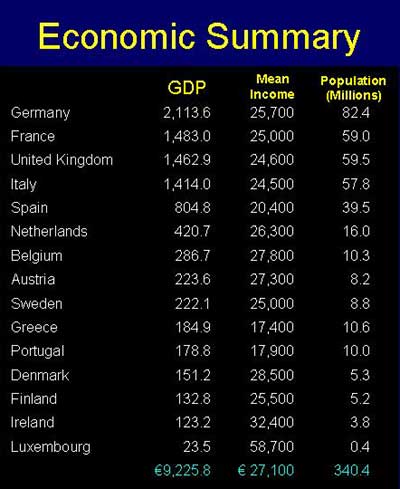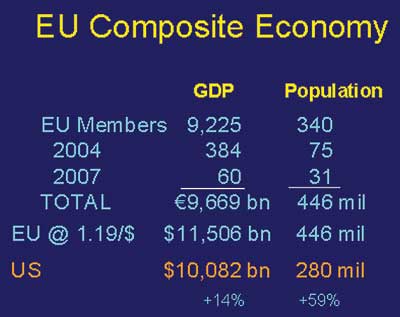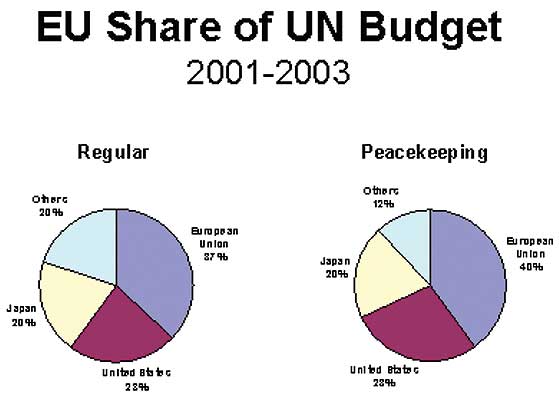In previous articles we reviewed the Biblical basis which led scholars to anticipate, over the many centuries, a reemergence of the Roman Empire. Clearly portrayed in Daniel's several prophecies, the sequence of conquering empires from Babylon, to Persia, to the Greeks, and ultimately to Rome have each followed the Biblical scenario. Likewise, the Roman Empire wasn't conquered, but fragmented into pieces. From Charlemagne on, the lingering concept of a "Holy Roman Empire" continued - despite Voltaire's classic rebuttal that it was "neither holy, nor Roman, nor an empire!" And the stage now seems to be set as these fragments appear to be combining in preparation for the final climax of the long awaited "last days."

Last month we reviewed the rise of post-war Europe, from the Treaties of Paris and Rome, the EEC ("the Common Market"), the EC ("European Community"), and now with the Maastricht Treaty, the EU ("European Union"). The existing 15 members currently represent a Gross Domestic Product of 9.2 trillion euros, with a population of about 340 million.
With the break-up of the former Soviet Union and the resultant availability of the now-independent eastern bloc states, the "Copenhagen Criteria" was established to qualify candidate members into the Union. It is interesting that the requirements established were not intended as barriers, but obstacles to be overcome. The European Union budgets over 3 billion in assistance to the candidate members to facilitate their preparation to join the Union. In January, 2004, the present 15 will be joined by ten new members, and in 2007, two additional applicants are scheduled to join.

This will bring the total economic unit into a federation that will have a population 60% larger than the United States, with an economy that is currently about 14% larger than the U.S. (when adjusted for the increasing euro).
Foreign Trade
Like most nations, in the United States foreign trade accounts for an increasing percentage of economic activity (e.g., Q1 2003: 23.8%). But the U.S. is becoming a consumer rather than a producer of economic activity: imports now represent 25% of all transactions, up from 14% in the 1980s. Furthermore, the U.S. foreign trade is conducted at a loss: the trade deficit is projected to exceed $548 billion in 2003. In contrast, the European Union gains a surplus of over 25 billion per year.
Shift of Jobs
Like most industrialized nations, the U.S. relegates an increasing number of jobs to low-cost labor countries, such as Mexico or Asia. U.S. factories have shed 2.4 million jobs since 2001, and it is estimated that 3.3 million more will move off shore by 2015.1 Europe, too, is taking advantage of the lower-cost labor in the candidate countries, where the average income is a fraction of the incomes among the member nations. What makes the European Union's distinctive advantage is that this labor source will be within their own tax base. As they continue to upgrade the infrastructures of these new members, from an agrarian to an industrial economy, they will also gain the long-term benefits.
The EU vs UN
All the EU member nations are members of the United Nations. France, Germany, Spain, and the United Kingdom are presently on the Security Council. (Two are among the five permanent members, ten others are elected by the General Assembly for two year terms.) It came as a surprise to me to discover that the EU is a larger contributor than the U.S. to both the UN operating budget and peacekeeping budgets.

The strange antics by France and Germany prior to, and during, the recent Iraq War was among many episodes highlighting the jockeying for position regarding the EU. It is unclear at this time whether the European Union will "take over" the UN, or simply eclipse the UN's commitment to irrelevancy on the world scene.
The Enigma of Turkey
One of the more enigmatic applicants for EU membership is Turkey. They spent the better part of a century attempting to be part of the West. In 1925 Turkey adopted the Western calendar; in 1926 it adopted the Swiss civil code (and later the Italian penal code); in 1928 the country switched to the Latin alphabet; in 1931, the metric system; in 1934 all Turks were obliged to take a surname (Mustafa Kemal became Kemal Ataturk), and the women were given the vote.
Following World War II, Turkey joined all the main Western institutions: the UN in 1945; the IMF in 1947; the OECD in 1948; the Council of Europe in 1949; NATO in 1951. In 1963, after four years of application, Turkey received associate membership in the European Community. Turkey's agreement specifically held out full membership as an eventual goal and their application in 1987 was ahead of Austria, Finland, Sweden, and Norway (whose applications were accepted and expedited).
Turkey lost its largest trading partner after the 1991 Gulf War. Now, pressured by France, previously favored by oil contracts with Iraq, Turkey declined the US use of its bases, despite a commitment of $80 billion in aid. Nevertheless, it now seems clear that they have been rejected by the European Union. (While at the Air War College recently, I had the opportunity to discuss this with some 3-star officers that were in attendance, and they expressed optimism that Turkey will be allowed admittance.) I personally retain my doubts for a number of reasons. Among other considerations, Europe presently has about 14 million Muslims in its population. If Turkey joins, they will bring in 63 million more.
Another aspect that commands our close attention is the possibility that the scene is being set for the Magog Invasion depicted in Ezekiel 38 and 39. ("Meshech" and "Tubal" were principal cities in ancient Anatolia, which constitutes the eastern three-fourths of modern Turkey.) We simply need to watch and see.
So What?
The tensions between two major powers dominated the past 70 years: The U.S. and the USSR. Both are on the decline for different (or perhaps similar) reasons. The void is being filled with two emergent superpowers: China and Europe. It has been the policy of the U.S. to encourage the formation of an Atlantic trading partner. It is now becoming clear that what has emerged is more of an increasingly aggressive competitor. And the anti-U.S. sentiment in both Germany and France, as well as the rest of Europe, is an increasing factor on the global horizon.
Jesus chided the Pharisees in that they could discern the signs of the weather, but could not discern the "signs of the times."2 We may well be even more culpable! As we scan our global horizon, the weather clouds are clearly forming. There is a clearly discernible restructuring towards the classic Biblical scenario that scholars have been anticipating for almost 2,000 years!
As we watch the movement of nations, the continuing global antipathy towards God's land grant to Israel, and many other clearly discernible strategic trends in our society, it is, indeed, a time to do our homework, rethink our personal priorities, and prepare to honor our Coming King!
Notes:
- Forrester Research, as reported in Investor's Business Daily, July 1, 2003.
- Matthew 16:3.





